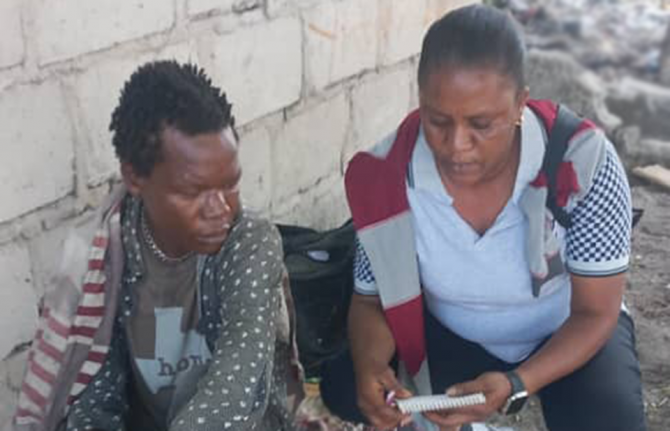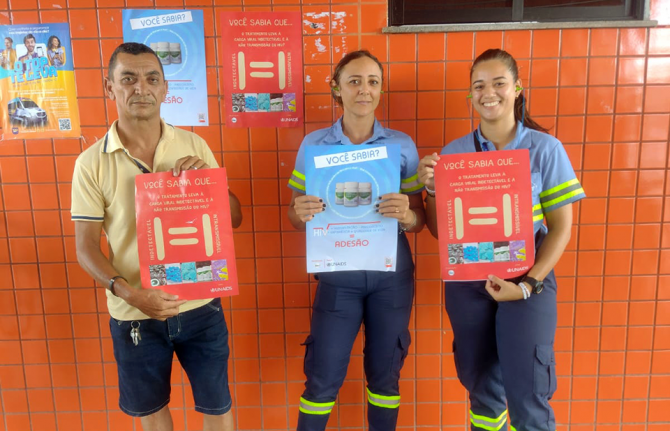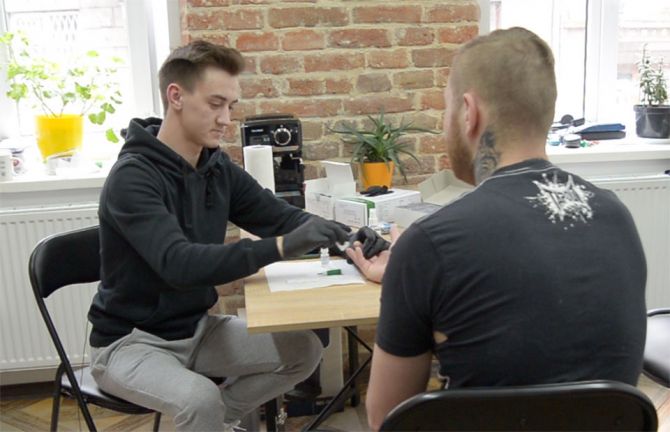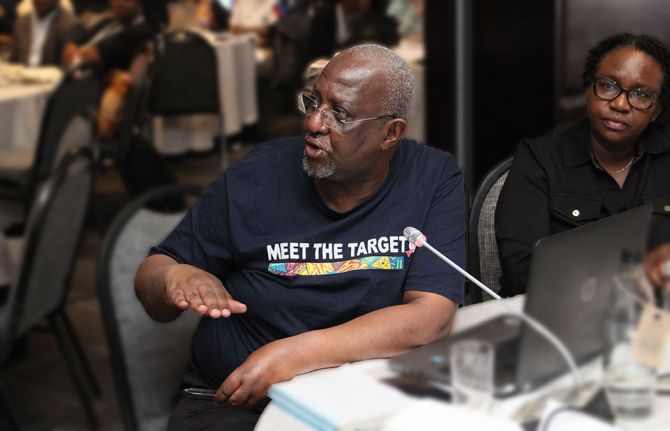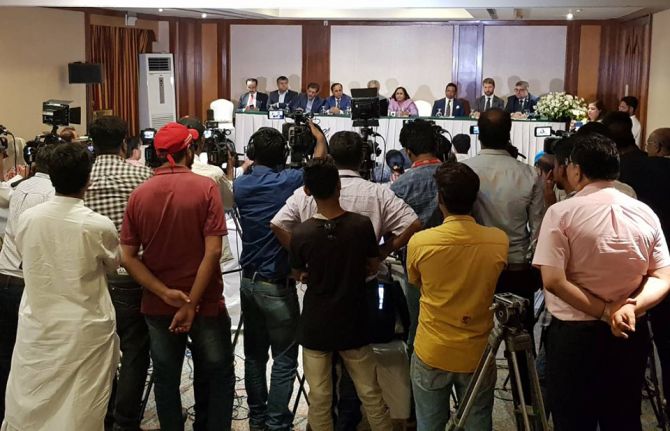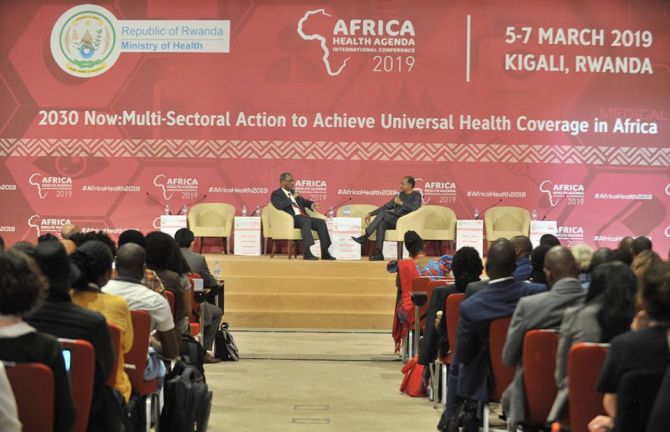
Feature Story
The challenges of pandemics for Africa’s development
27 May 2009
27 May 2009 27 May 2009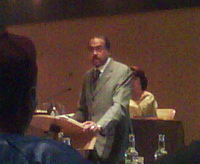
UNAIDS Executive Director Mr Michel Sidibé participated in the Forum on African Dialogue where he delivered a presentation on the challenges of pandemics for Africa’s development. Credit: UNAIDS
Africa Day, the official day of the African Union, is observed every 25 May. It is an opportunity to celebrate African diversity and success, but also a time to reflect on the challenges remaining in Africa’s road to development.
To mark the 46th anniversary of Africa Day, the African Union Permanent Representation in Geneva organized the First Forum on African Dialogue which took place on the 27 May 2009, under the theme “Africa’s Development: Whose Responsibility?”
The Chairperson of the African Union Commission (AUC), Mr Jean Ping, officially launched the dialogue forum. The Dialogue brought together representatives of the Swiss government, Ambassadors of permanent missions in Geneva, United Nation Organizations, private sector and other development organizations including the African Development Bank.
UNAIDS Executive Director Mr Michel Sidibé also participated in the forum where he delivered a presentation on the challenges of pandemics for Africa’s development. Mr Sidibé highlighted the role that infectious diseases play in Africa’s underdevelopment. Africa is the region where 11% of the world population live, and is home to 60% of people living with HIV. More than 300,000 children are born every year with HIV when vertical transmission (transfer of HIV from mother to child) has virtually disappeared from most European countries.
“If Africa is to progress with its development, we need to transform health from being Africa’s greatest challenge into being its greatest resource,” said Mr Sidibé. “But we desperately need a pan-African vision on how to get there. We need to engage all partners, from governments to civil society, and development partners, to make a decisive contribution to the health of current and future generations” he added.
Mr Sidibe pointed out that AIDS has shown the need for an institutionalized response in Africa, that is owned and lead by national partners from government and civil society.
During his intervention, Mr Sidibé emphasized the need for a continental vision on how Africa will lead in the response to its epidemics. According to Mr Sidibe, the actions required to transform approaches to health and development are to improve systems for resource management; use human resources effectively; redefine and reorient programmes for research and development to make sure they address Africa’s health priorities; and address trade issues, between Africa and the rest of the world, and within Africa so access to commodities is permanent and sustainable. He called for a greater leadership and mutual accountability to expand universal access to HIV prevention, treatment, care and support to all in Africa.
Right Hand Content
Press center:
Feature stories:
African Ministers reaffirm commitment to Millennium Development Goals (04 April 2008)
African Ministers meet to discuss 21st century challenges (01 April 2008)
External links:
Related

Feature Story
Ambitious project brings key countries in eastern and southern Africa closer to ‘knowing their epidemics’.
25 May 2009
25 May 2009 25 May 2009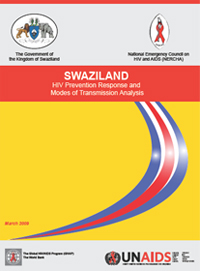
Cover of Swaziland report.
Credit: UNAIDS
If national HIV prevention strategies are to succeed, countries must understand the character and drivers of their epidemic and focus on proven need through sustained and effective interventions. However, there is often a mismatch between HIV prevention efforts and the actual factors driving new infections. This can lead to significant resources being invested in programmes of limited effect which do not reach those most at risk. To address this situation in five African countries, National AIDS Authorities, UNAIDS and the World Bank have produced a series of detailed reports that aim to characterize the true nature of the respective epidemics and their drivers, the existing HIV prevention response and the allocation of funding for prevention.
The leadership demonstrated by the countries that have undertaken this analytic work is a first and important step towards building effective prevention strategies
Mark Stirling, Director of UNAIDS Regional Support Team for Eastern and Southern Africa.
Drawing on new and existing data, final synthesis reports from Kenya, Lesotho, Swaziland and Uganda look at the expected distribution of new infections over the next 12 months. (Mozambique, the fifth country, will release its study soon and Zambia is also preparing a report). On the basis of all the data, the reports assess the alignment between this evidence and the HIV policies and interventions in the countries. The four reports then offer recommendations to improve national HIV prevention strategies. Already, they have begun to feed into existing national planning and policy deliberations, in some countries going as far as informing development and review of prevention strategies and policy guidance.
“AIDS continues to undermine every effort and investment towards human development in this region. Countries, therefore, cannot afford to ignore the pressing need to review national HIV prevention strategies to ensure greater efficacy,” said Mark Stirling, Director of UNAIDS Regional Support Team for Eastern and Southern Africa. He added, “The leadership demonstrated by the countries that have undertaken this analytic work is a first and important step towards building effective prevention strategies.”
The studies give very specific illustrations of challenges emerging from the relative lack of evidence-based policies and programmes, while acknowledging that all of the countries have made considerable progress in addressing HIV and that several have seen their epidemics stabilize.
In Lesotho, for example, which has the third highest adult prevalence in the world, the study shows that there is an “exceptionally high” number of multiple and concurrent sexual partnerships before and during marriage. The bulk of new infections in 2008 were likely to occur in those reporting a single-partner (35-62%) and people in multiple partnerships. Yet, according to the report, national prevention strategies do not explicitly address concurrent partnerships and no activities are designed specifically for adults, married couples and people in long-term steady relationships.
The Kenya report describes a mixed epidemic that varies considerably across the country, requiring interventions planned and implemented at local level. However, strategies were found to be “general and overarching” and not specifically aimed at most-at-risk populations, which include those in certain mobile occupations such as the fishing community and truck drivers. Even where the evidence shows a clear need for it, Government funding aimed at other most-at-risk groups, such as sex workers, their clients, men who have sex with men and injecting drug users is “negligible or non-existent”.
It emerges, therefore, that across the countries significant resources are invested in a range of prevention interventions that are not rigorously evaluated for their “impact or quality” and, for some, spending on prevention is considered simply too low. (Spending in this area varied from 13% of the national AIDS budget in Lesotho where adult HIV prevalence is 23.2%, to 34% of the AIDS budget in Uganda with adult prevalence of 5.4%).
According to Debrework Zewdie, Director of the World Bank’s Global HIV/AIDS Unit, "The current global economic situation has made it more important than ever to get the most impact possible from our investments in HIV prevention. These syntheses use the growing amounts of data and information available to better understand each country's epidemic and response, and identify how prevention might be more effective. They are guiding the programmes we support."
The reports give concrete recommendations on how to move towards a more efficient use of resources through more evidence-informed prevention strategies. For example, Uganda recommended the establishment of clear policies, standards and guidelines to improve counseling and testing services, IEC and behaviour change interventions for married and long-term sexual partners, people living with HIV and at risk groups. Swaziland also recommended that married, cohabiting and steady couples be acknowledged as a priority population and, further, that stronger political leadership for HIV prevention be exercised in order to build widespread engagement to address the complex norms underlying the level of vulnerability to infection in the country.
The National AIDS Authorities and the UNAIDS and World Bank teams who have produced these wide-ranging and rigorously researched reports see them as an initial round of synthesis work which will form part of ongoing AIDS-related evaluations aimed at strengthening and sharpening national responses to the epidemic.
Note: The Analysis of Prevention Response and Modes of Transmission Study series is part of a programme of work led by National AIDS Authorities and UNAIDS Country Office teams with support from the UNAIDS Regional Support Team for Eastern and Southern Africa, UNAIDS Geneva and the World Bank's Global HIV/AIDS Programme.
Right Hand Content
Cosponsors:
World Bank
World Bank Global HIV/AIDS Monitoring and Evaluation Team (GAMET)
Feature stories:
Consultation held on definition and measurement of concurrent sexual partnerships (24 April 2009)
Talking about OneLove in Southern Africa (06 February 2009)
HIV: Know your epidemic, understand the politics (07 January 2009)
Understanding HIV transmission for an improved AIDS response in West Africa (03 December 2008)
The Lancet: Series on HIV prevention launched (06 August 2008)
Publications:
The analysis of prevention response and modes of transmission study (MOT) synthesis reports:
Kenya (pdf, 2.20 Mb.)
Lesotho (pdf, 1.39 Mb.)
Swaziland (pdf, 1.70 Mb.)
Uganda (pdf, 797 Kb.)
A framework for monitoring and evaluating HIV prevention programmes for most-at-risk populations ( pdf, 374 Kb.)

Feature Story
Remembering Rodger
25 May 2009
25 May 2009 25 May 2009By Eric Sawyer, veteran AIDS activists and cofounder of Housing Works.
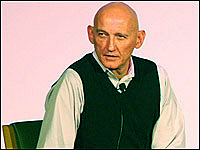 appeared at a screening of Outrage at the Tribeca Film Festival in New York in May 2009.
appeared at a screening of Outrage at the Tribeca Film Festival in New York in May 2009. Credit: Getty Images/Andrew H. Walker
This week, I got the unexpected news that my friend, the legendary AIDS activist Rodger McFarlane had taken his own life. I was in shock and deeply saddened.
Roger was a terrific friend, not only to me as an individual and countless others around the world but a terrific friend to the LGBT (lesbian, gay, bisexual and transgender) and HIV communities as well. Rodger was a co-founder of ACT UP New York. He was a mentor to countless activists and employees at numerous AIDS organizations and a critical supporter, both intellectually and financially of advocacy for gay and lesbian and HIV causes. Rodger was a hero!
Rodger was critical to the development of many of the largest and most effective organizations that would lead the fight against AIDS. He started the first AIDS hot line on his own home phone; he was the first executive director of GMHC (Gay Men’s Health Crisis) and Broadway Cares/Equity Fights AIDS (he combined the two organizations). Rodger was also the President of Bailey House and later the executive director of the Gill Foundation.
An accomplished athlete, Rodger had no physical fear and his quick mind made him a brilliant strategic activist; Rodger always could construct a plan to rectify any problem and was able to find the clever media hook to draw public attention to the problem. He never reacted with anger and haste. He preferred a planned response, crafted with a cool hand. He was insightful, never flustered and always had a “we can lick this approach” to overcoming any challenge.
“Tell me what's going on," would be followed by, "That outrageous!" and then, "Here's how we fix this thing." He would then ask "What do you think?" He was always ready to hear suggestions to refine his ideas.
Rodger takes on Guantanamo Bay
When ACT UP and others were fighting to close the HIV detention camp at Guantanamo Bay, I went to Rodger and asked for help planning a high profile press event and civil disobedience action. Again it was: "Tell me what's going on, -that's outrageous!” followed by, “Let's kick their motherf***ing asses!" and, "Here's what we do..."
And here is what he did: Rodger hired young ACT UP member and fledging producer David Binder (now a Tony nominee for “33 Variations”) to produce a rally and press conference at Rockefeller Center near the immigration programs passport office. We managed to get Dennis DeLeon (then the New York City Commissioner of Human Rights), Jessie Jackson, Susan Sarandon and director Jonathan Demme and other high-profile AIDS community members involved in a coalition planning effort, and before we knew it, 40 boldfaced names had been arrested on Fifth Avenue for blocking traffic while demanding medical parole for the sickest and the closing of the camp.
Jessie and Rodger insisted that we all go through the system and stay over night in jail to keep the TV cameras on the issue. They both agreed it would have optimal benefit to keep our issue in the media for as long as possible.
Within a few hours Mayor Dinkins was dispatched to the jail, at US President Clinton's request, to talk Jessie and the rest of us into a quick quiet release. He did not want negative attention about what was becoming an increasing public black eye to his fledgling Presidency.
Jessie was told that the Clinton Administration would look favorably on our demands if we took desk appearance tickets and left jail quickly to turn the press heat off. We were warned that to stay in jail over night would have a less favorable response. Jessie said that David had asked him personally as well, as a good Democrat, to leave with him right away.
We caucused and decided that we were likely to get some of our demands met if we left, ultimately helping the HIV-positive detainees in Guantanamo. We felt that while this war was not over, the battle had been won; we had Bill Clinton dispatching Mayor Dinkins to respond to our actions. We took the desk appearance tickets and left the holding cells. Shortly thereafter all the pregnant women and people with a full-blown AIDS diagnosis were released from the Guantanamo HIV detention camp—the same camp where the terrorist are being held today.
Thank you Rodger, for all you did. Rest peacefully our fearless warrior!
Eric Sawyer is a veteran AIDS activists and cofounder of Housing Works.

Press Release
UNAIDS Executive Director met Caribbean delegations
21 May 2009 21 May 2009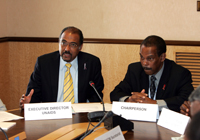
UNAIDS Executive Director Michel Sidibé (left) with Dr Edward Greene, Assistant-Secretary General, CARICOM Secretariat. 20 May 2009 Geneva. Credit: UNAIDS/P. Virot
UNAIDS Executive Director Mr Michel Sidibé met on Wednesday 20th May with a delegation of the Caribbean community (CARICOM) at the 62nd World Health Assembly to discuss the Caribbean priorities for collaboration with UNAIDS.
Dr Edward Greene, Assistant-Secretary General of the CARICOM Secretariat and Mr Karl Hood, Minister of Health of Grenada and Chair of the Council of Human and Social Development of CARICOM, opened the meeting acknowledging Mr Sidibé’s leadership in accelerating the global response to HIV as well as the vital role played by UNAIDS in setting up and fostering growth of the Pan Caribbean Partnership against HIV (PANCAP).
In October 2008, during CARICOM’s 7th general assembly, participants approved the Caribbean Regional Strategic Framework for 2008-2013 which focuses on actions that will enable countries to achieve universal access to HIV prevention, treatment, care and support by 2010.
Participants at the meeting made a call to UNAIDS to institutionalize and further strengthen the support it provides in the region. They called for UNAIDS to focus country assistance upon fully implementing the agreed regional Strategic Framework.
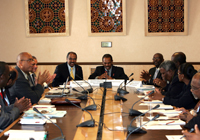
Participants during the UNAIDS - CARICOM delegations meeting that took place on the sideline of the 62nd World Health Assembly. 20 May 2009 Geneva. Credit: UNAIDS/P. Virot
In response, Mr Sidibé reaffirmed UNAIDS’ commitment to provide its experience and technical support to help improve PANCAP’s capabilities to support its work at the international, country and community levels.
Mr Sidibé noted to participants that he recognised the need for strengthened technical support in the region. To this end he highlighted the importance of establishing a Technical Support Facility in the region.
During his intervention, Mr Sidibé highlighted the need to bring together all United Nations organizations working in the region under one action results framework. He also proposed the creation of an advisory group with representatives of CARICOM that could advise the UNAIDS Regional Director in identifying and coordinating priorities for an effective response to the epidemic in the region.
All participants agreed that the CARICOM – UNAIDS collaboration is producing positive results in the response to AIDS and reiterated their commitment to further strengthen the partnership.
Right Hand Content
Feature stories:
Migrant workers and HIV vulnerability in South Asian and South East Asian countries (18 May 2009)
Sixty-second World Health Assembly to be dominated by A(H1N1) (18 May 2009)
UN Cares: UN system workplace programme on HIV launched in Asia Pacific (2 December 2008)
UN Secretary-General opens UNPlus exhibition (1 December 2007)
UN Plus meets UN Secretary General (22 May 2007)
Multimedia:
External links:

Feature Story
UN Secretary-General meets HIV positive UN staff members
20 May 2009
20 May 2009 20 May 2009 Members of UN Plus, UN Secretary-General and the UNAIDS Executive Director gathered for a meeting in Geneva on 20 May 2009. Credit: UNAIDS/P. Virot
Members of UN Plus, UN Secretary-General and the UNAIDS Executive Director gathered for a meeting in Geneva on 20 May 2009. Credit: UNAIDS/P. VirotThe United Nations Secretary-General Mr Ban Ki-moon held a meeting in Geneva with HIV positive UN staff members and the UNAIDS Executive Director. The staff are part of a UN system-wide advocacy group called UN Plus which was set up in 2005 to promote the rights of HIV-positive staff and provide peer support.
Addressing the group, the Secretary-General reiterated his support to UN Plus and acknowledged his pride in the commitment and strength of its members.
UN Plus first met with Mr Ban in 2007, a meeting he described as “one of the most moving experiences of my life,” and today’s meeting was an opportunity for the group to update the UN Secretary-General on progress made and to request his continued support.
UN Plus Coordinator Bhatupe Mhango expressed her appreciation for work the Secretary-General has done in advocating for the rights of HIV positive people evidenced by his many meetings with people living with HIV when on official travel around the world.
The commitment to universal access includes universal access for all UN staff.
UNAIDS Executive Director, Michel Sidibé
The UNAIDS Executive Director, Michel Sidibé, also committed, personally and organizationally, to the vision of UN Plus and to continue to stand alongside and be a champion for all UN staff living with HIV. “The commitment to universal access includes universal access for all UN staff,” he emphasized.
The subject of inequality, including recognition of same sex domestic partnerships and health insurance, was central to the meeting’s agenda. The participants were in agreement that a harmonized approach across the UN system was needed to deal with the complexities of health insurance.
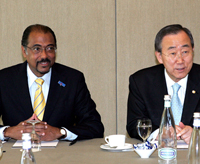
UNAIDS Executive Director Michel Sidibé and UN Secretary-General Ban Ki-moon listened to HIV positive UN staff members who are part of a UN system-wide advocacy group called UN Plus. 20 May 2009, Geneva.
Credit: UNAIDS/P. Virot
Since 2007 the group UN Plus, which is hosted and supported by UNAIDS, has grown to 150 members who include staff working in 41 countries in 21 UN agencies.
As part of its outreach strategy UN Plus has signed partnership agreements with other organizations, including FICSA (Federation of International Civil Servant Associations) and CCISUA (Coordinating Council of International Staff Unions and Associations). UN Plus has also continued to partner with key networks of people living with HIV including IFRC+, GNP+, ICW, and the newly-launched IPPF+ and has set up a women’s forum.
Such partnerships are at the core of UN Plus vision. As Kate Thomson, Head, Civil Society Partnerships Unit, UNAIDS noted to the Secretary-General, “UN Plus members have recently paved the way towards the adoption of a new agenda for Positive Health, Dignity and Prevention that will jointly bring UNAIDS together with positive networks globally for revitalized and collaborative efforts towards universal access.”
UN staff continue to have very real concerns about stigma towards those living with HIV. The Secretary-General was told that stigma remains a top concern as up to 80% of UN Plus members are undisclosed about their status. One of the participants from WHO, a mother, attended the meeting anonymously, underlining how real the personal and daily challenges of stigma and disclosure are.
For more on UN Plus visit its website: www.unplus.org
Right Hand Content
Partners:
ICW: The International Community of Women with HIV/AIDS
International Planned Parenthood Federation (IPPF)
Global Network of People Living with HIV/AIDS (GNP+)
International Federation of Red Cross and Red Crescent Societies (IFRC)
Federation of International Civil Servant Associations (FICSA)
Coordinating Council of International Staff Unions and Associations (CCISUA)
UN Cares
Feature stories:
Migrant workers and HIV vulnerability in South Asian and South East Asian countries (18 May 2009)
Sixty-second World Health Assembly to be dominated by A(H1N1) (18 May 2009)
UN Cares: UN system workplace programme on HIV launched in Asia Pacific (2 December 2008)
UN Secretary-General opens UN Plus exhibition (1 December 2007)
UN Plus meets UN Secretary General (22 May 2007)
Multimedia:
Related
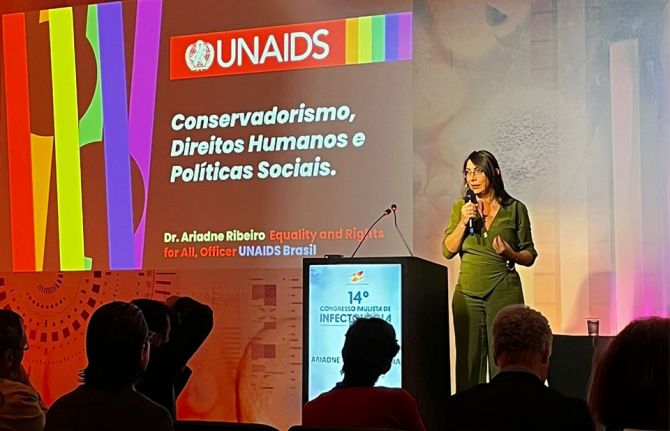 Upholding dignity for everyone: Ariadne Ribeiro Ferreira
Upholding dignity for everyone: Ariadne Ribeiro Ferreira

21 November 2024
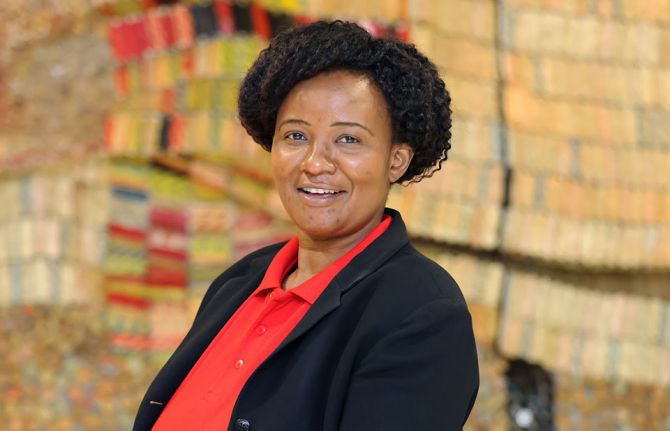 Evelyn Siula: A journey of strength and solidarity
Evelyn Siula: A journey of strength and solidarity
18 November 2024

Feature Story
Innovative financing for development the goal of new I-8 Group
20 May 2009
20 May 2009 20 May 2009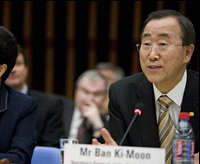 UN Secretary-General is in Geneva this weeking attending the World Health Assembly. Credit: WHO
UN Secretary-General is in Geneva this weeking attending the World Health Assembly. Credit: WHOAs global economic slowdown threatens to negatively affect those already most vulnerable to poverty, the achievement of the Millennium Development Goals (MDGs) around the world will require a change of scale in the implementation of innovative financing mechanisms for development.
To address this challenge, Dr Philippe Douste-Blazy, Special Advisor to the Secretary-General of the United Nations in charge of Innovative Financing, proposed the creation of a group which brings together eight finance initiatives, United Nations agencies and representatives of civil society.
The I-8 Group for the Millennium Development Goals held its first meeting in Geneva on 19 May 2009. The Secretary-General of the United Nations Mr Ban Ki-moon addressed the opening session, as did Dr Margaret Chan, Director-General of the World Health Organization (WHO) and Mr Michel Sidibé, Executive Director of UNAIDS.
We urgently need to strengthen and scale up existing innovative mechanisms, and explore new ones. This meeting will create a regular network of consultation, coordination and mutual reinforcement among innovative financing efforts worldwide.
The Secretary-General of the United Nations, Mr Ban Ki-moon
The current economic crisis, according to UN Secretary-General Ban Ki-moon, makes innovative financing all the more important.
“We urgently need to strengthen and scale up existing innovative mechanisms, and explore new ones,” said the Secretary-General in his opening remarks. “This meeting will create a regular network of consultation, coordination and mutual reinforcement among innovative financing efforts worldwide.”
If we are going to reach the Millennium Development Goals, we must avoid duplication, resist competition, and put people at the centre
Michel Sidibé, Executive Director of UNAIDS
Mr Michel Sidibé spoke of how the I-8 or "innovative eight" could help bridge the gap between development needs and resources committed and build a more just, equitable and healthy world. He also reminded participants of the human aspect of the challenge: “If we are going to reach the Millennium Development Goals, we must avoid duplication, resist competition, and put people at the centre,” said Mr Sidibé.
A panel discussion on innovative financing mechanisms was moderated by Dr Patrice Debré, French Ambassador for the fight against HIV/AIDS and communicable diseases at the French Ministry of Foreign and European Affairs.
The I-8 Group for the Millennium Development Goals includes the following finance mechanisms:
- The International Finance Facility for Immunization (IFFIm), created to support the Global Alliance for Vaccines and Immunizations (GAVI)
- UNITAID
- The Advance Market Commitments for vaccines
- The “Debt 2 Health” initiative of the Global Fund to Fight AIDS, Tuberculosis and Malaria
- (PRODUCT) RED
- The Responsible Social Investment initiative of the Agence Française de Développement (AFD)
- The use of revenues from the Carbon Market
- Millennium Foundation for Innovative Finance for Health
The objectives of the first meeting of the informal network included agreement on a common framework for future information sharing, an exchange of experiences, and the development of a joint message on the consequences of the economic and financial crisis for the developing world.
The aim of I-8 is to share experiences, work on one common set of messages to reinforce the current initiative from the High-Level Taskforce on Innovative International Financing for Health Systems and the Leading Group on Solidarity Levies to fund Development, prepare the ground for new initiatives, and coordinate the channelling of resources in order to achieve maximum impact on the ground. Through this it is hoped that future initiatives, whether new ideas or the extension of existing initiatives, can be implemented as quickly and successfully as possible.
The event took place during the sixty-second World Health Assembly which runs in Geneva until 22 May 2009.
Right Hand Content

Feature Story
ASEAN Health Ministers discuss A(H1N1) and AIDS issues
19 May 2009
19 May 2009 19 May 2009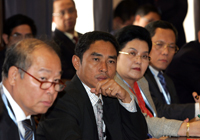
Ministers of Health of the Association of Southeast Asian Nations (ASEAN) gathered for an informal meeting on the sidelines of the World Health Assembly (WHA) on 19 May 2009 in Geneva, Switzerland.. Credit: UNAIDS/P. Virot
Ministers of Health of the Association of Southeast Asian Nations, or ASEAN, gathered for an informal meeting on the sidelines of the World Health Assembly (WHA) on 19 May 2009 in Geneva, Switzerland.
The main objective of the meeting was to discuss issues of common interest during the WHA, such as ASEAN’s strategies to address the A(H1N1) flu outbreak and prevent a pandemic as well as to discuss with UNAIDS Executive Director Mr Michel Sidibé strategies to achieve universal access to HIV prevention, treatment, care and support.
The meeting was chaired by Honorable Dr Francisco T. Duque III, Secretary of Health of the Philippines and supported by UNAIDS. It was a follow-up to the 2nd ASEAN-UN summit that took place in New York on 13 September 2005. In the New York meeting, participants adopted a Joint Communiqué stating the need for ASEAN members to have a voice in global forums such as the World Health Assembly and participate in global decision-making regarding allocation of funds for HIV prevention and control.
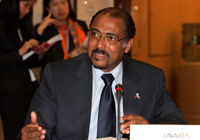
Mr Michel Sidibé, Executive Director of UNAIDS and Under Secretary-General of the United Nations presented his vision to the ASEAN countries and restated UNAIDS’ commitment to support countries in achieving universal access.
Mr Michel Sidibé, Executive Director of UNAIDS and Under Secretary-General of the United Nations presented his vision to the ASEAN countries and restated UNAIDS’ commitment to support countries in achieving universal access.
Mr Sidibé also outlined how a number of countries in the region have made significant progress in ensuring that the most vulnerable communities, including sex workers and their clients, men who have sex with men and injecting drug users, are a priority in national AIDS responses.
Mr Sidibé underscored the importance of government leadership in order to achieve the universal access targets and praised the commitment demonstrated by the ASEAN countries in responding to the AIDS epidemic as seen in their adoption in 2007 of the ASEAN Declaration on HIV and AIDS and the Declaration on the Protection and Promotion of the Rights of Migrant Workers.
At the end of the meeting, Health Ministers produced a Joint-ASEAN Ministerial Statement on ASEAN’s position in pandemic preparedness for avian, human and A(H1N1) influenza, particularly on cross-border collaboration, sharing of information and viral specimens, and universal access on HIV prevention, treatment, care and support.
Right Hand Content
Feature stories:
ASEAN Summit Special Session on AIDS (13 January 2007)
AIDS focus at ASEAN Summit (10 January 2007)
Multimedia:
External links:
ASEAN
Complete documentation for the sixty-second World Health Assembly
Key issues for the World Health Assembly 2009
International Health Regulations
Primary health care
Social determinants of health
Millennium Development Goals (MDGs)
Considerations on influenza A(H1N1) and HIV infection - WHO guidance note
More on influenza A(H1N1)

Feature Story
Sixty-second World Health Assembly to be dominated by A(H1N1)
18 May 2009
18 May 2009 18 May 2009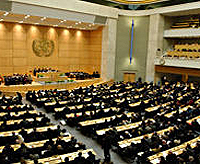
Photo (60th WHA)
Credit WHO/Peter Williams
This year’s World Health Assembly is set to focus considerable attention on the widespread outbreak of influenza A(H1N1), as Health Ministers and officials of more than 190 countries gather in Geneva from 18-22 May to discuss the most effective responses to the potential pandemic, including preparedness, access to vaccines and sharing of influenza viruses.
According to the latest World Health Organization (WHO) statistics, there are now 39 countries reporting a cumulative total of 8480 cases of A(H1N1) (17 May update). The virus represents a serious and growing health threat. WHO Director-General Dr Margaret Chan has called for “global solidarity” in the face of this unpredictable threat and the sixty-second World Health Assembly will provide an opportunity for such solidarity.
The World Health Assembly, convened by the Director-General of the World Health Organization, will also follow its broad remit to review progress and set new priorities for the WHO. Other issues to be examined will include primary health care and health system strengthening; exploring the social determinants of health and monitoring the achievement of the health-related Millennium Development Goals. There will also be room for the discussion of the programme budget for the next two years and internal management matters.
A key element of the meeting is the consideration of the revised version of the Medium-term strategic plan 2008-2013 which has 13 objectives including the reduction of the health, social and economic burden of communicable disease; mitigating the health consequences of emergencies, disasters, crises and conflicts; ensuring improved access, quality and use of medical products and technologies, and challenging the spread of AIDS, tuberculosis and malaria.
Delegates hope to build on the success of previous meetings. For example, in 2008 the assembly endorsed a public health, innovation and intellectual property strategy which promoted new approaches to drug research and development and championed the removal of barriers, enhancing access to medicines, especially for less developed nations. The gathering also adopted a resolution urging Member States to take decisive action to address the health impacts of climate change.
It is clear that the World Health Assembly is expected to explore a complex array of issues that transcend the sphere of health, touching on and interconnecting with a broad range of other sectors with the aim of mounting an effective challenge to global health threats.
During the week, UNAIDS Executive Director Michel Sidibé will participate in a range of side events including meetings with national ministers of health from around the world.
Right Hand Content
Cosponsors:
Feature stories:
Sixty-first World Health Assembly (19 May 2009)
Influenza A (H1N1) and HIV infection (01 May 2009)
Multimedia:
View photo gallery of opening day of World Health Asembly
External links:
Complete documentation for the sixty-second World Health Assembly
Key issues for the World Health Assembly 2009
International Health Regulations
Primary health care
Social determinants of health
Millennium Development Goals (MDGs)
Considerations on influenza A(H1N1) and HIV infection - WHO guidance note
More on influenza A(H1N1)

Feature Story
African Parliamentarians commit to universal access to HIV services
18 May 2009
18 May 2009 18 May 2009 UNAIDS and UNDP in West and Central Africa signed a memorandum of understanding with the Forum of Arab and African Parliamentarians for Population and Development (FAAPPD)
UNAIDS and UNDP in West and Central Africa signed a memorandum of understanding with the Forum of Arab and African Parliamentarians for Population and Development (FAAPPD) Credit UNAIDS/M.O. Dème
UNAIDS and UNDP in West and Central Africa have signed a memorandum of understanding with the Forum of Arab and African Parliamentarians for Population and Development (FAAPPD) formalizing the commitment of the Parliamentarians to work towards the goal of universal access to HIV prevention, treatment, care and support services in the region.
Established in 1997, FAAPPD is an organization of parliamentarians constituted of the national networks of parliamentarians working on health issues, including HIV, in 61 African and Middle Eastern Countries.
The role of parliamentarians in creating and strengthening societal dialogue on key issues such as access to HIV-related prevention, treatment and care services for the most marginalized and vulnerable is needed now more than ever.
Dr Meskerem Grunitzky-Bekele, UNAIDS Regional Director for West and Central Africa and Mr Jean-Christophe Deberre, Deputy Regional Director, UNDP West and Central Africa
The memorandum of understanding describes joint activities involving the regional partners in order to strengthen the role of the parliamentarians in a range of issues including leadership, law reform and ensuring the sustainability of the response to HIV through budgetary allocation.
Welcoming this important milestone of leadership for universal access, Dr Meskerem Grunitzky-Bekele, UNAIDS Regional Director for West and Central Africa and Mr Jean-Christophe Deberre, Deputy Regional Director, UNDP West and Central Africa noted that: “the role of parliamentarians in creating and strengthening societal dialogue on key issues such as access to HIV-related prevention, treatment and care services for the most marginalized and vulnerable is needed now more than ever.”
The signing of the memorandum of understanding is part of regional collaboration between partners UNAIDS, UNDP, UNICEF, UNODC, OHCHR, UNIFEM, UNFPA, ECOWAS, OSIWA, USAID and FAAPPD. By working together the partners hope to create an enabling environment for an effective AIDS response in West and Central Africa.

Feature Story
Migrant workers and HIV vulnerability in South Asian and South East Asian countries
18 May 2009
18 May 2009 18 May 2009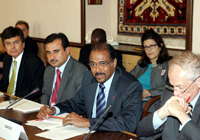
L to R: Dr Hasan Abbas Zaheer, Director, National AIDS Control Programme of Pakistan, Mir Ijaz Hussain Jakhrani, Minister of Health of Pakistan, Mr. Michel Sidibé, Executive Director of UNAIDS and Dr Kevin De Cock, Director, HIV/AIDS department at the World Health Organization. 18 May 2009. Geneva.Credit: UNAIDS/P. Virot
International labour migration, or the movement of people across national borders for employment, is a growing phenomenon and an increasingly important aspect of global, regional and national economies. However, HIV has become a key issue of concern with cross border and overseas migration.
Representatives of Pakistan, China, Thailand, Afghanistan, Bangladesh and Nepal together with senior officials from ILO, IOM, WHO and UNAIDS participated in a meeting on the issue during the 2009 62nd World Health Assembly. The meeting was a follow up on one held in Geneva during the 60th World Health Assembly in 2007. Initiated by the government of Pakistan, this year’s meeting highlighted the need to engage in inter regional dialogue between sending and receiving countries, especially countries under the Gulf Cooperation Council (GCC), to find ways to reduce the risks and vulnerabilities to HIV that migrant workers face.
Governments from Asian countries have raised their concerns regarding the large number of migrants in the region. At any given point in time, there are an estimated 58 million people on the move outside of their home countries within Asia and beyond. Outside Asia, the countries of the GCC region are the primary destination for a majority of migrant workers from the Philippines, Bangladesh, Sri Lanka and Pakistan.
The meeting provided a platform for Ministries of Health of sending countries in South and South East Asia to share experience on issues common to preparing workers for work outside the country especially in terms of reducing vulnerability to HIV and other health risks. The delegates also discussed how regional mechanisms, such as the Colombo process and the Abu Dhabi Dialogue, and international commitments could be harnessed to support dialogues and cooperation between sending and receiving countries as well as steps to developing a joint position/strategy to support negotiations and collaboration with receiving countries.
The meeting main objectives included:
- To identify a strategy for inter sectoral collaboration between Ministry of Health and Ministry of Labour to address HIV vulnerability among migrant workers in the Asian region
- To set up a Task Force to ensure a course of action and progress review. One of the immediate actions would be to map which countries are implementing HIV prevention programmes for migrant workers, including pre-departure and post-arrival orientation, and identify gaps and potential partners/resources
- To involve UN and other organizations committed to the issue at country and regional level in both sending and receiving countries
- To involve non-governmental organizations working with/for migrants as key partners to monitor development of migrant issues in countries in the region
UNAIDS Executive Director Mr Michel Sidibé also participated in the meeting whose outcomes will be considered in the upcoming UNAIDS board meeting which will discuss the issue of forced displacement and migrant populations in relation to HIV and the challenges of assuring such populations universal access to HIV prevention, treatment, care and support.
Mr Sidibe highlighted the need for evidence-based strategies focusing on the needs of migrant populations. He also underlined the importance of political leadership for an effective response to AIDS that will involve all sectors of society.
Challenging process to work abroad
Although migration has become a part of the economic functioning of many countries – both sending and receiving – migrants are often not perceived as individuals with rights. They can be exploited, marginalized and stigmatized throughout the migration process. Studies show that mobile populations are vulnerable to discrimination, exploitation and harassment at home and abroad. Their basic rights could be violated in terms of pay and working conditions. Migrants have often little or no right to legal or social protection and generally lack access to HIV services and information.
In recent years, an increasing number of migrant workers from Asia have been diagnosed with HIV in various countries in the Arab States. Deportations due to HIV status have resulted in severe economic loss for migrant workers and their families, who have been declared by authorities as “unfit” to work abroad.
As part of the visa process in some countries, migrants must undergo a health test including HIV from a certified clinic. In most cases, the migrant is referred to a specific clinic that is approved by the receiving country. For example, all migrants going to a country in the GCC must attend clinics authorized by GCC Approved Medical Centers’’ Association. They are expensive and mostly located in capital cities, adding extra costs such as transportation and lodging.
There is little or no referral to treatment or support services for those who do have a health condition, including those who test positive for HIV. If found HIV positive, most countries in the region will deport a migrant worker without explanation, with little compensation, and no consideration for the migrant’s rights or dignity.
Given the large numbers of people on the move, ensuring their rights and access to HIV prevention, treatment and care and support services is a crucial component of an effective regional response to AIDS.
Right Hand Content
Cosponsors:
Feature stories:
Sixty-second World Health Assembly to be dominated by A(H1N1) (18 May 2009)
New report shows Asian migrant women in the Arab states have heightened vulnerability to HIV (10 March 2009)
Migrants and HIV: “Far Away From Home” club (05 January 2009)
Multimedia:
View photo gallery of opening day of World Health Asembly
External links:
Publications:
HIV and International Labour Migration: UNAIDS Policy Brief(2008)






